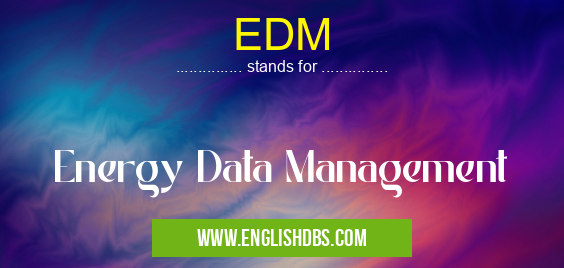What does EDM mean in SOFTWARE
Energy Data Management (EDM) is a comprehensive data handling process that is used to efficiently store, manage, and analyze energy-related data used in activities such as energy efficiency planning and program management. EDM is intended to support data-driven decision making, and helps to improve the accuracy of the resulting decisions.

EDM meaning in Software in Computing
EDM mostly used in an acronym Software in Category Computing that means Energy Data Management
Shorthand: EDM,
Full Form: Energy Data Management
For more information of "Energy Data Management", see the section below.
Definition
In general terms, EDM is the arrangement of raw energy data into useful and understandable forms. More specifically, EDM is the organized practice of collecting, organizing, and filtering energy information from multiple sources in order to better understand how it affects building performance or system performance. The main purpose of EDM is to help facility managers make informed decisions about their energy use by providing them with accurate and timely data.
Benefits
Data collected through EDM allows facility managers to better understand their energy consumption patterns and identify opportunities for cost savings or an improved efficiency. Additionally, EDM provides a means of tracking results over time which can be used to validate investments in sustainable technologies or educate stakeholders on progress towards achieving energy goals. The resulting insights provide valuable information that can be used to inform decisions regarding future investments or operational changes that may result in enhanced performance or cost savings.
Essential Questions and Answers on Energy Data Management in "COMPUTING»SOFTWARE"
What is Energy Data Management?
Energy Data Management (EDM) is a system of organizing data related to energy use, which may include the collection, storage, analysis, visualization and reporting of energy usage data. EDM systems are used to gain insight into the most efficient ways to use energy and identify opportunities for saving money.
How does EDM help to decrease costs?
By collecting data on energy usage and costs, EDM can help identify areas where improvements or cost savings could be made. This includes identifying when energy is wasted or more efficient products are available, helping businesses reduce their overall energy footprint and save money in the long run.
What type of data can an EDM collect?
An EDM system can collect a variety of data related to energy use including electricity, gas and water consumption; heating/cooling systems; building automation systems; lighting; equipment operation; PV solar performance; zone temperatures; weather forecasting and others.
What is the purpose of an Energy Data Management System?
The primary goal of an EDM system is to improve the efficiency of energy usage by gathering data from various sources on how energy is being used. With insights into exactly how much different types of equipment consume power over time, it becomes possible for businesses to optimize their own operations for maximum efficiency and cost savings.
Is an EDM always necessary for a business?
Whether an EDM system is necessary depends on many factors such as how complex your organization's power usage structure is, what type(s) of equipment you use and how much control you would like over your power supply. An EDM can be useful even in small-scale operations, however if the amount of monitoring required is minimal then another solution may be more appropriate.
How does an EDM help businesses comply with regulations?
Most countries have some form of regulation regarding emissions or other environmental considerations that companies need to abide by. An EDM provides valuable insight into where companies are using too much power or excessive emissions so these areas can be addressed before they become compliance issues.
Does implementing an EDM also affect my carbon footprint?
Yes - By providing detailed information on how your company utilizes its energy resources, an EDM gives you better visibility into activities that contribute significantly to your company's carbon footprint so improvements can easily be made. This ultimately helps businesses stay ahead in their industry while still adhering to regulatory standards for reducing emissions output.
What are some common features included in an Energy Data Management System?
Common features included in most Energy Data Management Systems include real-time monitoring and alerts as well as advanced analytics capabilities enabling users to understand trends in their usage patterns quickly and easily as well as drill down into certain parameters for further review if needed. Additionally, many solutions offer reporting capabilities which enable user insights without manual compilation efforts required with traditional methods.
Can I access my organization’s energy data from anywhere?
Yes - Cloud-based solutions allow users secure access anytime from any device connected to the internet giving them greater flexibility whenever they need it most.
Final Words:
In summary, Energy Data Management (EDM) is an essential part of any successful effort at improving energy efficiency for a building or system. From helping identify potential areas for improvement to providing meaningful insights into progress towards sustainability goals, EDM yields numerous tangible benefits when it’s properly implemented within a facility management strategy.
